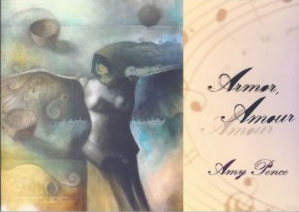Book Review

Amy Pence’s second collection, Armor, Amour, is made up of energetic, formally varied poems that explore a wide range of subjects—sexual desire, contemporary urban landscape, art and mythology, the natural world. The poems incorporate white space, and many sprawl across the page or are arranged in columns. The book is bound thoughtfully in landscape format (like D. A. Powell’s Tea) in order to accommodate the poems’ shapes.
Many of the poems are short—ten lines or less—and clearly informed by Dickinson, a subject of Pence’s scholarly research. She is named in the book’s final poem, “What Lasts”: “What lasts is the coiled activity / of the dead… / …even Dickinson / in those breaking drawers of earth.”
Pence has an ear for clipped, delicate sounds, as in the poem “Traffic Jam”: “shiver that fits our eyes: / cool stipples. Ah, /vehicular homicide:” Images of traffic and car wrecks appear throughout Armor, Amour, as do images of nature and the body. The book is full of flowers and birds, observed in a way that feels anxious and sometimes outright violent, as in “Vessell / II”:
The spine shatters
against a plum tree
Much of the book deals with sexuality, most explicitly in the fourth section, “Desire.” It’s not easy to write good poems about sex; the vocabulary we have to describe it is too limited. But Pence manages to transform old ideas. For example, she writes in “Water,” “I am flooded inside, / calling you.” This earnest physicality is tempered by surprising metaphor and a shift in syntax with the lines “The modernity of my body / shifts its crystal goblet / breaks in the mouth // of great birds.”
Pence is at her best and most complex when she uses form to get at her subject. Many of the poems are in columns that can be read both down and across, coexisting and intersecting in interesting ways. One such poem, “Armor, Amour,” addresses a lover. In the left column are the lines “my sisters’ / warnings:” but if you read across instead of down you get
my sisters’ know who you are,
warnings
Read this way, the speaker is addressing the warnings and equating warnings to the lover, resulting in the startling idea that one could be in love with warnings, or that sex is a kind of warning in itself. The speaker acknowledges danger while describing a tension between union and resistance, as the lines and the shape of the poem enact.
The words armor and amour bear an obvious visual and sonic relationship, while their meanings seem to be in opposition. The poems work through this binary thinking, concerned with questions of boundaries, of what is protective and what unites. Two beings never quite become one, though they often end up in the same place. This is true of lovers as well as other uncomfortable juxtapositions. Botticelli’s “The Mystic Nativity pasted on a storefront window”; “My cup leaves a ring / on the news: two-year-old / swallows crack, dies”; and in an embroidery sampler, “Above the alphabet / deer leap.”
The use of columns allows Pence to shift tone, setting, and image, and to engage personal, cultural, and political contexts. In the extraordinary long poem “Open Me,” the left side of the page contains some of Pence’s best writing about sex. The speaker moves rapidly between complex, understated metaphors, transforming each element as soon as it’s introduced. The poem opens with a cathedral, which gives way to a lotus, a fount, “a splinter singed,” and a stain created from the above elements, resulting in an image of ink on paper: “pure liquid i / rubbing off / at the margins.” And that’s all within the first few lines. This column is a poem complete in itself, not just in its subject and syntax, but sonically as well, in its use of rhythm and rhyme.
The right side of the page, in italics, introduces political subjects and more literal images: a cashier at Wal-Mart, a car wreck, an autopsy, models on a billboard, female circumcision in Indonesia, women in Baghdad markets strapped with bombs. As in the title poem, these columns can be read as two separate poems and as a single one, creating gravity and richness of meaning with each new juxtaposition. The poem manages this density without interrupting its extraordinary momentum. This is due in part to Pence’s use of white space, which allows the reader to apprehend the columns individually and together simultaneously and effortlessly—a remarkable use of form. “Open Me” is one of the best political poems I have read in a while.
The last section of the book is a collaboration with the composer and multimedia artist Hunter Ewen, who produced a song cycle based on Pence’s poems titled “Open Me: Song Cycle in Five Movements for Soprano and Piano” (available for download at www.ninebarkpress.org). The book reproduces his graphical musical scores, playful drawings that incorporate text and score in an interpretation of the poems and the music. As Ewen explains in his afterword, “Just as music brings new light to the word, the visual imagery lends new meaning to both the poems and music.” These five scores form a charming experiment. It’s refreshing to discover a small press willing to feature such an unusual project.
The poems of Armor, Amour reveal a serious mind wrestling with important subjects. The book is compulsively readable despite its gravity and occasional difficulty. It rewards the reader’s attention with a depth that continues to reveal itself. The more time I spend with these complex poems, the more I admire them.
About the Reviewer
Melissa Ginsburg is author of the poetry collection Dear Weather Ghost (Four Way Books) and the chapbook Arbor (New Michigan Press). Her poems have appeared or are forthcoming in Fence, Blackbird, Denver Quarterly, jubilat, and other magazines. She teaches creative writing at the University of Mississippi and edits the literary magazine Yalobusha Review.